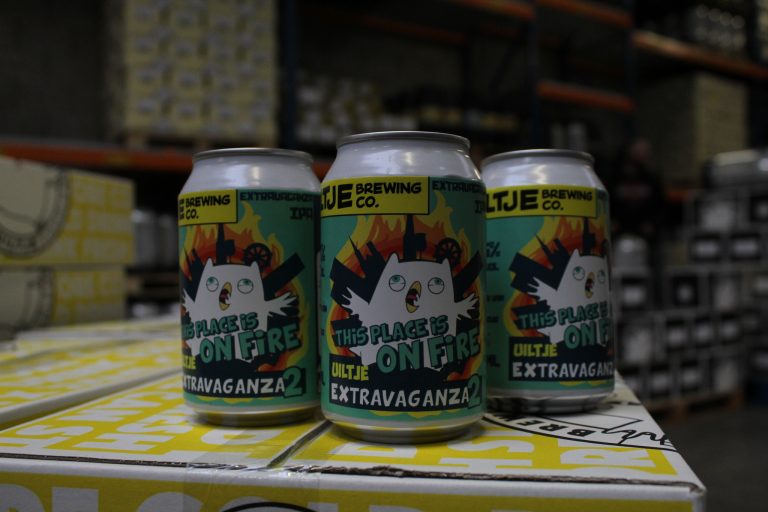This week’s topic of our blog is the somewhat controversial subject of canned beer. During my tours I often hear how people think that beer in cans looks cheap or that perhaps it doesn’t taste as nice as it does in bottles, however after some explanation I’m usually able to sway people’s opinion- I hope to be able to do the same with this blog post.
All sunlight is blocked
First of all, cans are opaque which means that absolutely no sunlight (in particular UV rays) can get through and damage the hops. Even with brown bottles, light can penetrate the bottle, causing the beer to be lightstruck which will result in the breakdown of the hops. Why go to all the effort of using lovely hops from around the world, only for them to be destroyed by UV rays?! We love brewing our IPAs which are bursting with hops and we want to ensure that these flavours last.
Cans are lightweight
Cans are a lot more practical than bottles as they are much lighter – I always joke that you go a lot faster on your bike if you have a rucksack full of cans rather than bottles! Not surprisingly, they’re also less likely to break and are easily stackable. Another practical reason for cans is that they are also quicker to chill, always important for a fun boozy evening!
Environmentally friendly cans
Finally, and an increasingly important subject, is that cans are more environmentally friendly. I’ve already mentioned that cans are lighter, which means less fuel needs to be used by lorries during transport and therefore have a lower carbon footprint and as they’re also less fragile than bottles they require less packaging material. They’re also made of more easily recyclable material (namely aluminium) which in turn makes it more likely to be recycled and reused!
I fully understand the appeal of a bottle, and for darker beers such as stouts and porters, I would be less worried about the risk of sunstrike for instance, however, as I’ve mentioned above, we love to brew crazy hoppy beers and the longer they can stay fresh, the better!
Why We Can
So whilst we’ve written and stressed the benefits of canning our beer in other blogs and through other social media platforms, we thought we’d look at how the can came to be as well as the environmental benefits of using cans.
The history of the Can
Would you believe it if I said that the can has quite a rich history? It dates all the way back to 1795 when Napoleon Bonaparte put out a reward of 12,000 francs for anyone who could devise a useful way of storing and preserving food. Now whilst it was a Frenchman by the name of Nicolas Appert that discovered that if you cook food in a sealed glass jar, it will stay preserved, it was in fact the English who took this a step further by putting food in tins. Tin is much stronger than glass, especially during transportation, so it proved (somewhat ironically?) to be very useful in the English Army and Navy.
It was only much later in 1930 that cans were used for beverages and a few years later, in 1935 for beer! A key element of putting drinks in cans was to overcome the problem of the beverage reacting with the metal of the can, and as such a lining (back then it was plastic and even wax) had to be devised, as well as ensuring the pressures could be contained. Aluminium cans were first introduced in 1958 but it was still no easy feat to open the can itself – It wasn’t until 1989, the ‘ring-pull’ design that we are all now used to was introduced to cans. So there we have it, a brief but somewhat rich history of the development of the can!
Environmental Benefits
So not only are cans better for beer in terms of protecting from light strike and reducing oxidation however there are a number of reasons why using cans are better for the environment. Cans are much lighter than bottles, so this means less weight during transport which in turn means less fuel usage (it’s also a lot lighter on your bike – the perfect excuse to buy more beer!). They’re also more robust – so you’ll need to use less packaging too. As for the cans themselves, they’re made of aluminium. Now whilst it is true that aluminium requires a lot of energy to produce, you can recycle indefinitely – meaning the cans can be used again and again! Now some might argue that this only works if the cans are recycled, which is true, but here in the Netherlands 92% of cans are recycled (one of the highest rates in Europe I might add!) so rest assured that they are being recycled and therefore reused.
Uiltje Canning Line
We want to ensure that our Uiltje fans only receive the best quality beer, so when we invested in a canning line, we ensured that it was one of the best available. You’ll now find that a lot of our beer, if not most, is now available in can – whether it’s our core range, our Fresh & Fast series or even one of our seasonal or one off beers. So the next time you’re out buying beer, make sure to buy cans if possible (and ideally the beer from us!) and remember how it’s not only better for the beer but also better for the environment. Check out our webshop to see what we have available!
